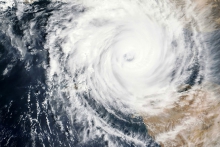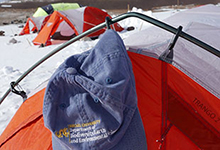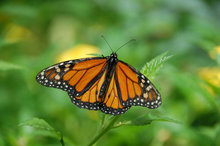
January 22, 2018
Weather changes, such as the unseasonably high temperatures in Philadelphia this fall, can have serious impacts on health, says Drexel’s Ali Kenner, PhD, assistant professor of political science and of science, technology and society — especially for senior citizens, who are at higher risk for climate-related health complications.
Read More

January 19, 2018
As hurricane Irma barreled toward south Florida in early September, Kathleen Reardon gathered her staff to give them something akin to a pep talk. The situation in the Caribbean looked truly frightening that morning, with Irma devastating island chain after island chain with a ferocity that left meteorologists astounded. There was talk, too, that the just-developing Hurricane Jose might turn northward and put Bermuda — the headquarters for Reardon and her team at global reinsurance firm Hamilton Re — in harm’s way as well.
Read More

January 19, 2018
For most people, the thought of camping conjures images of leisurely hikes and starry nights cozied up to a campfire. For geoscience prof Ted Daeschler, PhD, it resembles something more like a two-day flight, followed by a noisy jaunt via military cargo plane, culminating in a 100-mile helicopter ride into the remote terrain and sub-freezing temperatures of Antarctica’s McMurdo Dry Valleys.
Read More

January 18, 2018
Fifteen Drexel students stood bright-eyed and eager to entertain in front of cameras rolling at a local hospital. Part of a Drexel community-based learning course dubbed Story Medicine, the students were there to engage sick and disabled children through live broadcast programming, using skits to infuse laughter with a little education.
Read More

January 17, 2018
If you live in a town or city like Philadelphia where industrial facilities are emitting chemicals into the air, there is plenty of reason to wonder: How is this affecting me? Few communities have access to ambient air-monitoring data, and those that do rarely use it because it is complicated and lacks context.
Read More

January 17, 2018
A sixth-grade science fair project in 2014 led to the discovery that erythritol, the main component of Truvia, is a natural insecticide. Today, that discovery is the basis of a new Drexel-backed startup, BioLogic Insecticide. Simon D. Kaschock-Marenda, now a freshman at Drexel in the College of Engineering, was 11 when he noticed that Drosophila melanogaster, commonly known as fruit flies, died much quicker when they fed on Truvia than on other sweeteners. His father, Daniel Marenda, PhD, professor of biology in the College of Arts and Sciences, was unconvinced at first.
Read More

January 11, 2018
The typical images that “climate change” conjures include disappearing coastlines and melting polar ice. But what about animals’ brains — including our own? Can they be affected by the changing climate? Sean O’Donnell, PhD, professor in the College of Arts and Sciences, argues that they absolutely can.
Read More